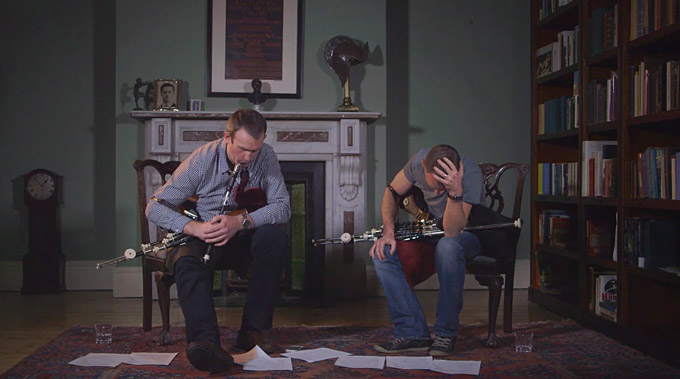
Elaine Byrne’s research-based practice examines overlooked histories, historical texts and artworks as a platform to mobilize history as it relates to current political and social concerns. Employing sculpture, video and photography Byrne focuses on opening new questions for the viewer to highlight present day urgencies.
The film centres on two Irish uillean pipers, Leonard Barry and Padraig Carberry McGovern, who are asked to perform Rakoczy’s March without any previous knowledge of the score. The music, which was once the unofficial national anthem of Hungary, is played by Irish pipers as Lipóti Virag (Leopold Bloom) departs for Százharminczbrojúglyás-Dugulás in James Joyce’s Ulysses (episode 12, Cyclops).
From the musicians initial startled reaction of hearing and reading the music, to their frustrated, repetitive and exhaustive attempts in realizing the score’s complex musical phrases, Byrne films the musicians in their attempt to discover if Joyce’s fictive reference to Irish pipes playing Rakoczy’s March is a viable literary construct.
In using Joyce’s text excerpt, Byrne creates a device to explore issues of censorship, nationhood and the rise in anti-Semitism or the ‘Other’. Mirroring the complexity of the musical score and the text, the film presents to the viewer questions that are prevalent in today’s global and conflictual societies. The dedication of the musicians to push their own musical knowledge and skill touch upon the enduring qualities of human’s need to overcome and survive yet they also explore the dichotomy of experience and factual knowledge, accelerated by the omnipotence of the digital world, and if fictional narratives have become the basis of fact in real life.
Emmett Place, Cork, Ireland
T12 TNE6
Tel: 021 480 5042
info@crawfordartgallery.ie
Opening Hours
N.B. Last entry is 15 minutes before closing
Monday–Saturday 10.00am–5.00pm*
Thursday until 8.00pm
Sundays and Bank Holidays
11.00 am–4.00pm
© 2024 www.crawfordartgallery.ie